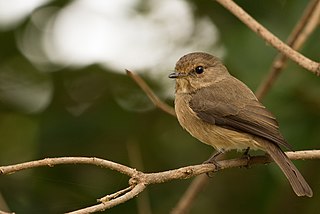
The Old World flycatchers are a large family, the Muscicapidae, of small passerine birds restricted to the Old World, with the exception of several vagrants and two species, bluethroat and northern wheatear, found also in North America. These are mainly small arboreal insectivores, many of which, as the name implies, take their prey on the wing. The family is relatively large and includes 351 species, which are divided into 54 genera.

The African paradise flycatcher is a medium-sized passerine bird. The two central tail feathers of the male are extended into streamers that commonly are more than twice as long as the body. The female tail feathers are of moderate length and without streamers. The upper parts of the male body, wings, and tail are boldly coloured in chestnut or rusty shades, but the underparts and the head are variably grey to blue-gray, with the head of the mature male being darker, commonly glossy black with greenish highlights. The beak and other bare areas, including a wattle ring round the eye, match the colour of the surrounding feathers. The female coloration is similar, though not so showy and glossy and with the head paler.

The red-bellied paradise flycatcher, also known as the black-headed paradise flycatcher, is a medium-sized passerine bird of the family of monarch flycatchers. It is native to intra-tropical forests of Africa. The male bird is about 17 cm (7 in) long and has a black head, a mainly chestnut body, and a tail with streamers nearly twice as long as the body. The colouring is somewhat variable across the bird's range. Both females and juveniles lack the tail streamers and are a duller brown colour. It is closely related to the African paradise flycatcher, and the two can hybridise.

The African dusky flycatcher, also known as the dusky-brown flycatcher or dusky alseonax, is a small passerine bird of the Old World flycatcher family, Muscicapidae. It is a resident breeder in Africa from Nigeria, the Central African Republic, South Sudan and Ethiopia south to South Africa. It is very common in its woodland habitat, which includes riverine forests, evergreen forest edges and clearings, especially near water bodies such as lakes, dams and streams, and well-wooded suburban gardens.

The black-and-white shrike-flycatcher, also known as the black-and-white flycatcher or vanga flycatcher, is a species of passerine bird found in Africa. It was placed with the wattle-eyes and batises in the family Platysteiridae but is now considered to be more closely related to the helmetshrikes and woodshrikes.

The Abyssinian slaty flycatcher, also known as Abyssinian flycatcher, Abyssinian black flycatcher or Abyssinian chocolate flycatcher, is a species of bird in the family Muscicapidae, the Old World flycatchers. It is often placed in the genus Dioptrornis. It is native to Africa, where it occurs in Eritrea and Ethiopia.

The African blue flycatcher or blue-crested flycatcher is a species of bird in the family Stenostiridae from western and central Sub-Saharan Africa.

The white-browed forest flycatcher is a species of bird in the family Muscicapidae.

Fraseria is a genus of passerine birds in the Old World flycatcher family Muscicapidae that are found in Sub-Saharan Africa.

The African shrike-flycatcher or red-eyed shrike-flycatcher is a species of bird in the family Vangidae. It is the only species in the monotypic genus Megabyas.

The ashy flycatcher is a species of bird in the Old World flycatcher family Muscicapidae. It is found throughout sub-Saharan Africa, excluding the drier areas of South Africa, Botswana, and Namibia, where it inhabits subtropical or tropical dry forest, subtropical or tropical moist lowland forest, and savanna. It has a disputed generic placement, with different authorities variously putting it in Muscicapa, Fraseria, or other genera. Ashy flycatchers are mostly grey in colour, with pale grey or white underparts, and display no sexual dimorphism.

Chapin's flycatcher is a bird species in the Old World flycatcher family (Muscicapidae). It is native to the Albertine Rift montane forests. The Itombwe flycatcher was formerly considered conspecific.
The olivaceous flycatcher or olivaceous alseonax, is a species of bird in the family Muscicapidae. It is sparsely distributed throughout the African tropical rainforest. Its natural habitats are subtropical or tropical moist lowland forest and subtropical or tropical swamps.
Tessmann's flycatcher is a species of bird in the family Muscicapidae. It is sparsely distributed across the African tropical rainforest from Sierra Leone to the Democratic Republic of the Congo. Its natural habitat is subtropical or tropical moist shrubland.

The grey-throated tit-flycatcher is a species of bird in the family Muscicapidae. It is widespread across the African tropical rainforest.

The grey tit-flycatcher is a species of bird in the family Muscicapidae. It has an extensive but patchy distribution in sub-Saharan Africa.

Fraser's rufous thrush, also known as the rufous flycatcher-thrush, is a species of bird in the thrush family.

The blue-mantled crested flycatcher or African crested flycatcher is a species of bird in the family Monarchidae found in eastern and south-eastern Africa.

The blue-headed crested flycatcher is a species of bird in the family Monarchidae, native to the African tropical forest.

Bates's paradise flycatcher is a passerine bird belonging to the monarch-flycatcher family, Monarchidae. The sexes are similar in appearance with the upper parts being rufous and the head and underparts being bluish-grey. It is native to central Africa where it is found in the understorey of forests.



















